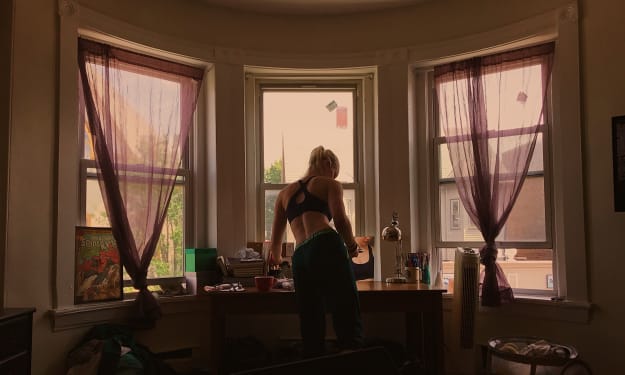
Amelia Clare Wright
Bio
Amelia is a recent graduate from Emerson College majoring in Communications Studies. She finds passion in language, photography, and learning, and hopes to pursue a life full of all three.
Stories (9/0)
The Tip of My Tongue
One I wake up building ancient cities in my head, pulling strands from the sun into my fingertips and enlivening the universe. I wake up with sand in my eyes and dust drifting in beams of light, things falling out of balance and into place. I wake up to the most beautiful sunrise I've ever seen. (I'm pretty sure I imagined it.) I wake up with brilliance today, and I may never go back to sleep. Everything I've ever wanted is on the tip of my tongue, the tip of my tongue, the tip of my tongue, so close I can taste it. I wake up to my future built with stardust in the night and the only thing missing is you. I wake up with the emotional nausea that accompanies distance, that nests comfortably in your body, tying your stomach in knots and erecting tombs in your chest, when your other half is an image, a thought not capable of steering you by your shoulders. I wake up with this emotional nausea, and I drink a glass of water, and I shower, and I maybe cry a little (because water is the cleansing cure for everything, and I rinse myself at least twice daily), and I am okay. Because the light in my room looks gentle, like the sun is holding me, cradling my body in its rays and handing me off to the room as my day settles and I drift into sleep.
By Amelia Clare Wright5 years ago in Poets
Relinquishing Armor
To be an actor requires levels of strength that are taken for granted in everyday life. To stand on a stage, in front of a camera, and exploit your experiences to become someone else requires a lot of us. A lot of courage, a lot of compassion, and crazy amounts of vulnerability. But what do these things even mean?
By Amelia Clare Wright7 years ago in Journal
How To Be Good at School
I watch her face glow with defiance as her jaw tightens to restrain her voice. Not hours later, I hear her screaming down the hallway, octaves above her usual pitch, with frustration. Our AP Literature teacher will never know the passionate disagreement she feels towards his analysis of The Stranger. He will never know that she believes the book to be closer held to Marxist theory, because she will never tell him that she sees no evidence supporting Mersault’s existentialism. Confinements and prescriptions struggle to infiltrate her imaginative ideation, but her headstrong skull refuses to let anything in or out. Her mask is built firmly with steel and she is sealed shut within. She clings to individuality underlying her fraudulent educational ideology.
By Amelia Clare Wright7 years ago in Education
The Panopticon of the Patriarchy
The patriarchal society lived in today is commonplace. Women find themselves constantly shorted in conditions ranging from violent rapists found innocent to girls told to cover their shoulders in school so as not to distract the boys in the room. These circumstances are a direct result of a panoptic mechanism abducting the idea of masculine power as dominant over femininity and fixing it into society so subtly that people rarely notice or have the ability to protest it. Foucault presents the central idea of Panopticism in Discipline and Punish: power is “visible and unverifiable,” (555). The sexist society in the United States exhibits these symptoms. For example, as Berger shows the reader in Ways of Seeing, men are visibly seen as favorable in art. However, it is essentially unverifiable because there is no sure way of knowing the inspiration, the intent, or the impetus behind the artist’s painting — consciously or subconsciously. Foucault’s presentation of the Panopticon directly represents and results in the relationship between male and female in today’s society as shown in Berger’s work, Ways of Seeing. As Berger puts it, “Men look at women. Women watch themselves being looked at” (47).
By Amelia Clare Wright7 years ago in Viva
Mental Illness As a Scapegoat
The idea of blaming or using another person to absolve oneself of sin is ever present. From the primitive scapegoating of eliminating humans from a tribe in response to a natural disaster or other inexplicable misfortune, to more modern concepts of blaming subordinates for a business mistake, the scapegoating of humans tends to fall on those whom we consider to be weaker or of less importance than ourselves. However, we often practice scapegoating using ultimately unchanging and superior forces. When there is no secondary person to place the responsibility on, we scapegoat by saying that the event was out of our control. This case can be seen throughout history in the form of religion and faith as humans place blame on a god or higher force when things go wrong. However, today many people find a scapegoat in their own mentality.
By Amelia Clare Wright7 years ago in Psyche
A Collection of "Ands"
There are words dripping from my lips in no sensible order. They are empty; as much as I try to fill them with the passion and the past married to them in my mind, they are detached, and I am sorry for that. There are messages on my tongue, and poems perched on my fingertips, and ideas begging to be released and turned into rants of no importance all because of you, and because of your smile, and because you smell like flowers and soaked cedar and comfort when I bury my face in your shoulder, and I love that about you.
By Amelia Clare Wright7 years ago in Humans
A Promise of Improved Replies
The first time Jon called me nurturing, my heart shriveled like a grape left to dry. I felt my intestines inside my body as if someone were unraveling them to be placed in front of me to see. All my vulnerabilities, my softness, all my feminine tendencies that I had worked so hard to suppress in favor of a tough rind over my heart, they were all exposed and very much so real, no longer hidden. I sat on the carpet in the ninth floor hallway, the smell of which now sends me into a sort of hazy post-traumatic flashback, with his head in my chest trying to remember how to breathe. Nurturing was weak. Nurturing was needy and destitute and soft. I knew how nurturing got in the way of dreams. I watched my mother succumb to her maternity: she regretted missing her daughters grow up when she went to work, and she regretted falling behind in her passion when she stayed home. Every beat of my heart begged and screamed for me to fall to the opposite, to hurt and insult him and prove to him that I am not nurturing, I am strong. Trying to re-identify myself—as a nurturer, a caretaker, a lover, even, at only seventeen—was one of the hardest commitments I’ve ever made. And I am still coming to terms with the fact that I did it for us.
By Amelia Clare Wright7 years ago in Humans










